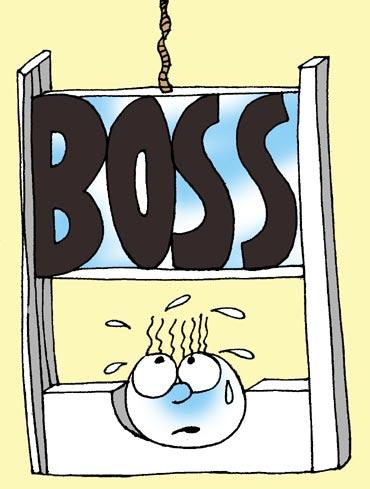 | « Back to article | Print this article |
Tips to deal with a difficult boss at work
'Look inwards. Before you complain how bad your senior is, ask yourself: Are you being the best subordinate to your boss?'
Swapnil Kamat, CEO of Work Better India decodes the issues Indian professionals, both young and senior, face at the workplace and how to deal with them.
What is the biggest complaint Indian managers have about their subordinates?
Is lack of planning an increasing problem among young professionals?
For a country that has produced talent in almost every other field and claims to be one of the world's largest workforce, why is communication becoming our Achilles' heel?
Do the current crop of MBA graduates have it in them to be the next N R Narayana Murthy or Satya Nadella?

Swapnil Kamat, CEO, Work Better India, a training and development firm that organises corporate workshops across the country for organisations such as E&Y (earlier Ernst & Young), Bank of America, HDFC and Philips, gives us a realistic picture of the most common issues facing Indian professionals and offers quick solutions.
Read on...
What are the issues confronting modern day professionals at work?
Most issues young professionals face today have nothing to do with the world economy or the overall slowdown in the job market.
Once they've graduated from college, they feel they are done with all the learning and education.
If they land a good job at the end of it, they think they have more or less accomplished what they wanted in life.
So what's the issue, you may ask?
They don't concentrate on self-education after college; they don't focus on developing new skills or improving their work and attitudes at the workplace.
Please click NEXT to continue reading...
'Most women in India feel their career is secondary to that of the man'
Do senior managers have the same problem working with young subordinates?
Precisely. Despite having a top class degree, a majority of young professionals lack communication, planning and organisation skills.
They are unable to present their ideas.
They underestimate the importance of planning in advance and are unable to organise their tasks.
This callousness often irks senior management.
Who is to be blamed for this?
Blame it on poor orientation from peers, the family or the institution they graduated from.
In all my interactions with young professionals, I say this: Formal education can only get you a job. But if you want to succeed, you must invest in developing your core competency skills.
What are the issues women professionals in India face?
Indian women have this fundamental belief that they cannot make it to the top.
Look at the women icons who have made it to the top -- Chanda Kochhar, CEO of ICICI Bank is an inspiring example.
Also, the way an Indian woman looks at her career is quite worrying.
Most women in India feel that their career is secondary to that of the man of the house. She has no qualms about sacrificing her career to look after kids or take care of the family.
Interestingly, she does this because society expects her to do it.
Society expects her to sacrifice her career.
She must realise that her career is as important as her man's.
How important/relevant is an MBA for career success?
How important? Very important.
How relevant? Depends on which institute you did it from.
I'm saying this because 10 years ago, there were just a handful of institutes offering the course. Today, there is no dearth of options.
I may sound blunt when saying this, but the quality has also suffered.
Given the rate at which we have advanced in terms of technology and business, the MBA course curriculum of some of these institutes seems outdated and rubbish.
It needs an immediate revamp.
There's a huge gap between what’s taught in these institutes and what’s happening in the real world.
We must have institutes that have people like Narayan Murthy addressing the class. Academic knowledge alone is not going to serve the purpose for an aspiring manager.
Lack of communication skills among engineers and managers is becoming a national problem.
There is a wide gap between expectations and ground reality, which needs to be addressed and immediately.
'Professionals in India just want to talk, talk and talk'
What are the greatest communication blunders Indian professionals make?
While the rest of the world is arguing how we majorly lack in speaking and writing skills, let me tell you that together they make up only 50 per cent of the communication problem.
The remaining 50 per cent, also the most ignored part of communication process, involves listening and responding correctly.
Professionals in India, including some at the senior level, just want to talk, talk and talk, but who's paying attention?
How can one improve one's communication skills?
- Before you begin any communication, be clear about who your audience is -- the age group, the attitude and expectations of the target audience.
- Ask yourself why you're making the pitch. What is the purpose of the communication?
- Also, don't forget to ask: What's in it for the audience?
- The key to improving any communication begins with improving one’s ability to listen. If you listen correctly, you'll respond better.
- Be specific about what you convey. For example, instead of saying: You may submit the project file by today evening, say: You may submit the project file by 5 pm, today.
- Be simple and direct. If the idea is too big to fit in one sentence, break it into smaller simple sentences.
What are the five essential characteristics of a successful CEO?
A successful CEO exhibits the following traits:
- A burning desire to succeed and excel
- Relentless pursuit and persistence to chase something
- The ability to organise and plan things
- Must be proactive, not reactive
- Understands the importance of hard work and talent for there are times when hard work gets the better of talent.
'Are you being the best subordinate to your boss?'
How to be a good team leader
- An ideal leader is one who nurtures the desire to develop his/her skills. If you do not exhibit the skills yourself you cannot expect your team to perform under you. For example if the Indian cricket captain expects his team to put up a good performance, he must also invest in building his personal performance so that the team can look up to him for inspiration.
- S/he must understand the importance of appreciation. Reminds me of a famous line by Mother Teresa: There is more hunger for love and appreciation in this world than for bread. A leader must know when to appreciate the efforts of his subordinates or team members and must do it more often than not.
- Take tough actions/decisions: This point is important only to those who have followed the above two. A manager is not hired to please his employees but do what is best for his employer and the organisation that hired him/her. After all that you've done to encourage your team members, if they fail to perform, perhaps it's time you took tougher action.
- Start by sharing your feedback and if that doesn't work, perhaps you can even consider sacking the employee/s.
Tips to deal with difficult managers at work
People always complain how inefficient their bosses are. But they seldom talk about their own weakness. So, here's my two cents:
- Look inwards. Before you complain how bad your senior is, ask yourself: Are you being the best subordinate to your boss? If you're not the best, what is it that you’re not doing right and what can you do about it? Concentrate and get busy with that.
- Don't wait for the best manager, be the best subordinate you can and notice the difference.
- Take the initiative to understand the preferences of your immediate manager. Does s/he believe in punctuality, discipline or task completion? Follow that.
Always understand that the boss is your primary customer.
Tips to be happy at work
- Find a job you love and you'll never have to work a day in your life.
- The grass will always be greener on the other side. If you keep changing jobs aspiring for greener pastures, you'll never be satisfied.
- Understand your personality type -- Are you a manager, an entrepreneur or just a good negotiator? Choose a job that best matches your personality so that you can make the most of your talent.
Please click NEXT to continue reading...
Three must-read books for professionals
Books every Indian professional should read...
- The Success Principles by Jack Canfield. It talks about confidence and will guide you towards your dream.
- The Art of Thinking Clearly by Rolf Dobelli. It will tell you about the 99 flaws in the way you think.
- Creative Confidence by David and Tom Kelle will help you connect with the creative you.
What lessons did you learn from your own career and life?
- Anything that looks easy may take years to achieve. When I started off, I thought it was easy to make a lot of money, but I was wrong.
- Great ideas are important, but execution is more important.
- Ensure that you're innovating. All the time. Because if you don't, someone else will and you’ll lose the race even before it's begun.
Stories we would like you to read!
Click on MORE to see another feature...





